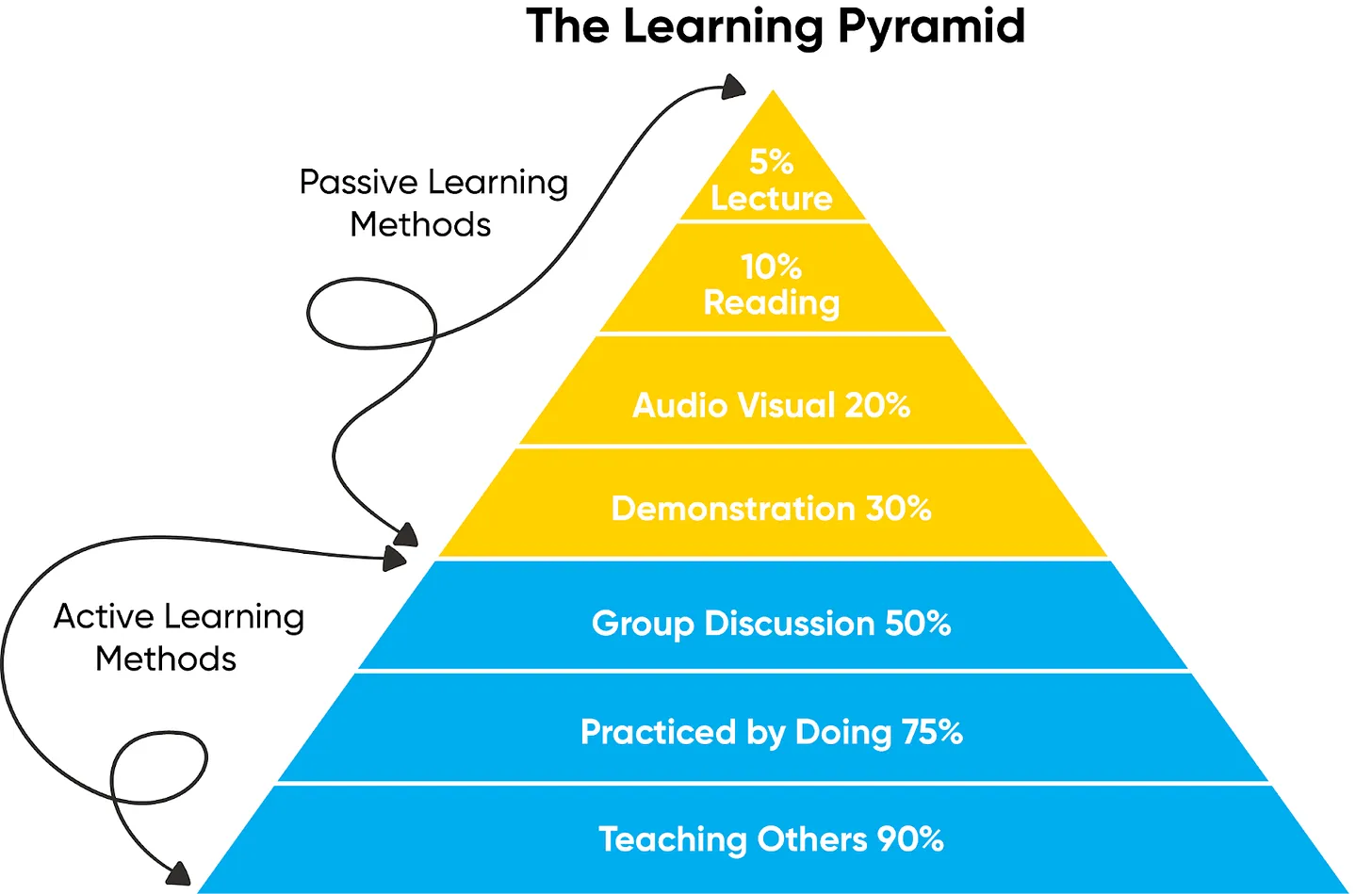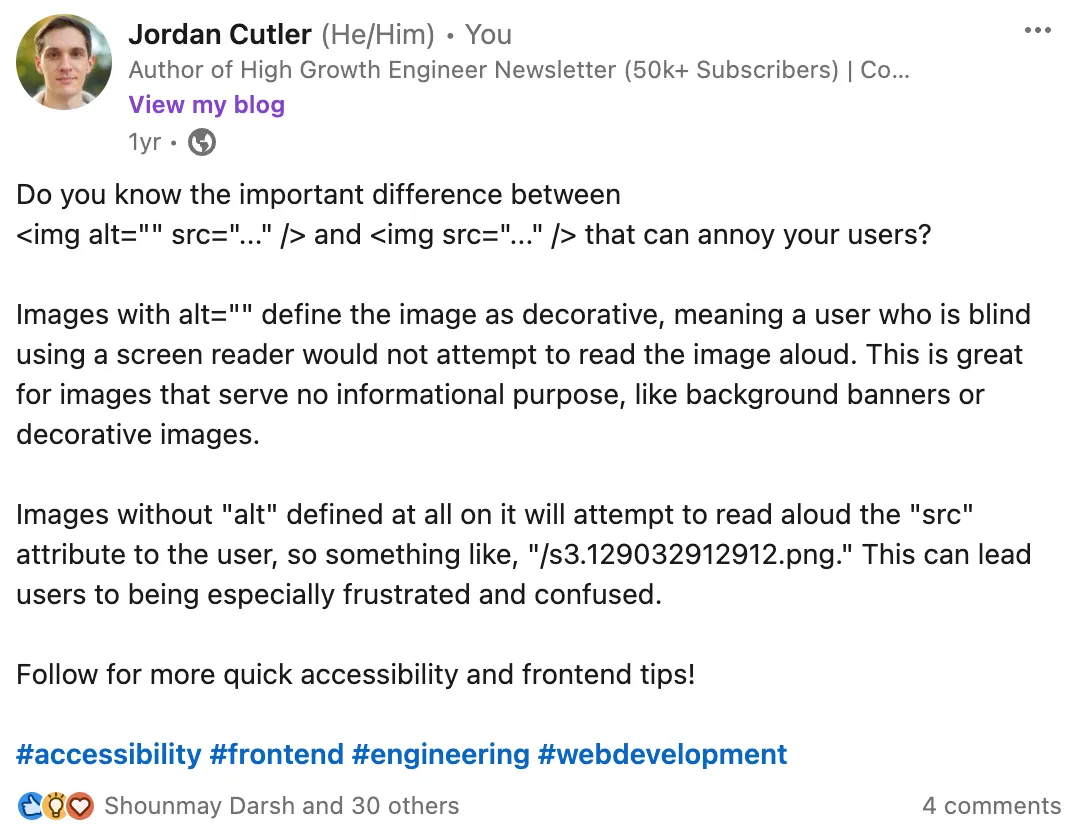Tips and Lessons from Jordan Cutler's Rapid Career Growth
An exclusive interview with Jordan Cutler, Senior Engineer at Pinterest, on his career journey, mentorship, and strategies for professional growth.
If you have used LinkedIn recently, you are sure to have seen posts from Jordan Cutler, who often shares bite-sized tips regarding software engineering career growth on the platform. Jordan is currently a Senior Frontend Engineer at Pinterest and runs the popular newsletter, "High Growth Engineer".
If you missed it, Jordan also contributed the popular blog article Top 5 CSS Mistakes made by Front End Engineers.
The GreatFrontEnd team recently had the pleasure of interviewing him.
Welcome, Jordan! We're thrilled to have you here. To kick things off, can you share a bit about yourself? What are your hobbies, and what's your go-to comfort food?
Hey there 👋 and yeah! I'd love to. A few things I like to do are train my cats (one can do a high-five), play frisbee, and spend time with my girlfriend. My go-to comfort food would be french toast or pancakes. I love ALL breakfast food.
Your newsletter, "High Growth Engineer", has a large following. What inspired you to start it, and how do you manage your time between the newsletter, your work, and other commitments?
Even though I started my newsletter last year, it goes back to my time working at Gusto ~4 years ago.
Part of what led to me growing to Senior Engineer quickly was being so public about what I was learning.
I did demos, presentations, and learning posts in Slack sharing what I knew. That helped me become better and grow others.
When I wanted to learn frontend more, I made a Slack channel called #jordans-frontend-learnings. In it, I shared tiny snippets of frontend knowledge I was learning. Other people could join and learn, and since the channel was called #jordans-frontend-learnings, I didn't feel bad about spamming.
Eventually, over 50 people joined, and it became a community of people sharing their learnings, so we changed the name to #frontend-learning.
From starting that channel, a few things happened:
- I created more connections across the org that made life better at work
- I became known as a frontend voice people could get guidance from
- I realized my learning skyrocketed from sharing and discussing with people
That 3rd point is so key to my newsletter and writing online.
I still remember exact posts I wrote in the #frontend-learning channel to this day. It's not the same as reading an article and moving on.
Below is a pyramid showing how much you retain from each learning method.
You retain 90% of what you teach others, compared to 5% from a lecture.

When I switched roles to Qualified, I thought, "What if I did something like what I did at Gusto, but broader? Post online rather than only internally?"
So I gave it a shot. This was my first LinkedIn post, 375 days ago:

That post led to more LinkedIn posts, which led to expanding to a newsletter.
Over a year later, after writing a newsletter each week, I'm still here, constantly learning.
Can you share some specific lessons or trends you've identified through writing your newsletter that have significantly impacted your approach to front end engineering or mentorship?
The biggest mistake I've seen, especially as most people work remotely now, is dismissing the importance of being visible.
There's a common claim: "Your work should speak for itself".
I agree. But that's not how it works in reality. And people don't have the time for your work to speak for itself. You need to advocate and make the impact clear to others.
At this point, people think, "Ok, so I need to brag." That's also not true!
Every time you share about your work, it should give value to whoever you are sharing it with. Most of the time, this comes down to teaching and celebrating others. You can do this through sharing documentation, teaching via a presentation, or making a launch announcement and celebrating who helped make it happen.
For a full list of how you can be visible while giving value, check my article on becoming a go-to person.
As a mentor to many engineers, with several advancing in their careers under your guidance, what qualities do you believe make an effective mentor, and how can engineers build successful mentoring relationships?
First: Empathy. A mentor needs to relate to their mentee.
That's why the best mentors are 1-3 years ahead of you, not 10+ years. For example, I'd have difficulty mentoring someone graduating college because things have probably changed a lot.
Empathy allows you to create a strong bond with your mentee and prevents them from feeling judged. Your mentee will feel comfortable talking about anything with you.
Second: Experience.
A good mentor has a wide variety of experiences to draw from and remembers what worked, what didn't, and why. They help their mentees navigate challenges they experienced before and set them up for success.
You've developed a course on Maven – "Mid-level to Senior for high-growth engineers". What gaps did you aim to fill with your course, and what feedback have you received from participants?
Each cohort has about 25 engineers in who are on the cusp of Senior Engineer, but feel stuck. I teach the course I wish I had when I was at mid-level trying to get to Senior.
We cover 5 modules:
- Leading Projects
- Becoming a go-to person
- Getting your manager to want to advocate for you
- Becoming a trusted mentor
- Writing Senior-level code
In each module, I cover the principles behind why the lessons work. Those principles stick with you as you go beyond the senior level.
Feedback-wise, it's been amazing! Across 2 cohorts, I received 33 ratings, averaging to 4.8/5 stars.
This is one of my favorite reviews:
This course was the missing link between my growth as an engineer and being promoted. I wish I had taken this course earlier in my career to have implemented the mindset and practices taught in this course. I believe I would have had more success if I had. This course is great because it doesn't focus on teaching you the answers but rather the right questions to ask yourself so that you can navigate your career – mindsets not prescriptions. Jordan is a relatable, enthusiastic, and kind teacher. He takes the time to understand his students and their questions and will provide you with 1:1 time during office hours or over Slack to make sure you're fully taking advantage of the material.
If you want a preview of the full course, I recently release the "Becoming a go-to person" module on Taro.
Great to hear that you're now a Senior Front End Engineer at Pinterest. What unique challenges and opportunities have you encountered in this role?
Since joining Pinterest, I feel like I'm more behind my peers than ever 😅. My peers get a lot done in a day. They're experienced, strong communicators, and excel technically.
To keep up with them, I create systems for myself. One system that's made a huge difference for me is planning my week and estimating how long I'll spend on each task. I also assign "important" and "urgent" scores to each task to help myself prioritize. This plan sets me up for success because I can start the day working on the biggest priority rather than playing email or Slack whack-a-mole.
At the end of the week, I reflect on how much I accomplished compared to my plan and adjust for the future. I'll also use my reflections as a "brag sheet" for my performance review.
Sometimes, I worry the planning and reflection take too much time.
But here's the math: 2 hours of planning and reflection = 5% of a 40-hour workweek.
So if that plan and reflection makes you at least 5% more efficient, it's worth it. For me, it saves me time by cutting out unimportant work. Plus, I know exactly what I need to work on at any time. It's more than worth it.
As Abraham Lincoln says: "Give me six hours to chop down a tree and I will spend the first four sharpening the axe."
For GreatFrontEnd users looking to fast track their careers, what strategies or steps would you recommend to accelerate their professional growth and reach senior positions faster?
Invest in yourself early in your career. The first 5 years of your career are the most important. After that, the expectations rise. You're expected to know a lot and grow others. You'll never stop growing, but putting the work in for those first 5 years will make the rest smoother when the expectations increase.
To put this into action, I recommend investing in courses, books, newsletters, and platforms like GreatFrontEnd. Structure is key, and these resources provide it.
You have a sizable LinkedIn following and presence, where you share insights and advice often. How has engaging with the community on social media influenced your career and personal growth, and what tips do you have for leveraging social media for career advancement?
So. Many. Benefits. I encourage everyone to learn in public and write online.
The top 3 benefits I experience are:
- Learning: I retain what I write 10x better than what I read
- Opportunities: I receive offers to speak or get access to free benefits. For example, I recently hosted a roundtable at Plato Elevate in San Francisco, an honor typically only available to Senior managers, Directors, and VPs.
- Mentorship: I become a better mentor for my mentees. I can send them a curated set of posts or articles that I've saved up to help them with their situation.
Start with 1 LinkedIn post and go from there. Get better every time and be consistent. Do what is sustainable for you.
Follow Jordan Cutler on LinkedIn, check out his newsletter and Maven course "Mid-level to Senior for high-growth engineers".